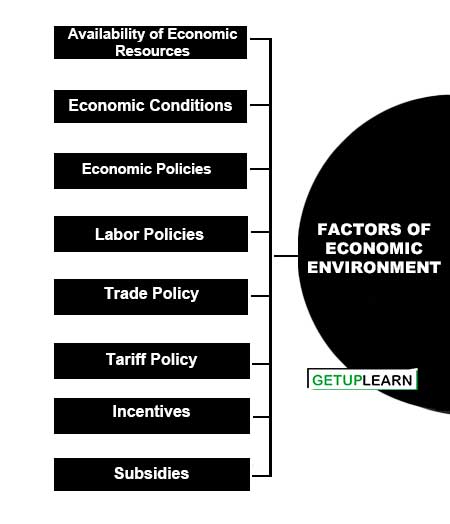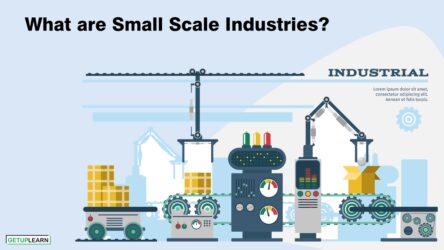Table of Contents
What is Economic Environment?
Economic environment refers to all those economic factors which have a bearing on the functioning of a business unit. Business depends on the economic environment for all the needed inputs. It also depends on the economic environment to sell the finished goods.
Naturally, the dependence of business on the economic environment is total and it is not surprising because, as it is rightly said, business is one unit of the total economy.
Environment is of multidimensional in nature. It includes all those actions which make the economic activities possible in the country.
Factors of Economic Environment in Business
Economic resources, economic conditions, economic policies, trade policy, labor arrangement, incentives and subsidies are some of the important factors which constitute economic environment. These are discussed below:
- Availability of Economic Resources
- Economic Conditions
- Economic Policies
- Labor Policies
- Trade Policy
- Tariff Policy
- Incentives
- Subsidies

Availability of Economic Resources
Availability of adequate quantity of natural and physical resources encourages entrepreneurs to undertake more entrepreneurial activities. Effective utilization of these resources is possible only through entrepreneurship. It will help the entrepreneurs to earn more profit and retain the profit for further expansion programmed.
Economic Conditions
Economic conditions govern the enterprise ability to remain viable. Inflation, interest rates, unemployment, per capita income, consumer purchasing power, exchange rates are some of the important factors which provide sufficient symptoms about the conditions prevailing in the economy as a whole.
For example, when inflation rates are high entrepreneurs pay more for supplies and may raise their prices to cover these costs. In case of high inflation rate Government may be forced to initiate regulation of price and wage structure through guidelines etc.
Economic Policies
Economic policies determine the direction and volume of the business. For example in socialist economies decisions with regard to what to produce, how to produce, for whom to produce and how much to produce are to be taken by the Government or central planning system like Indian Planning Commission.
Government is responsible for formulating these economic policies to regulate the level of production and consumption. In free economic system, it is for the market forces to decide all these things and Government regulatory role is restricted to a nominal level.
Labor Policies
Labor is an important and active factor for production or service process. Volume of production and costs are governed by the productivity of labor to a large extent. So, in practice, Government should formulate such policy which will ensure timely payment of sufficient wages, strengthen the social security system and improve labor productivity.
If entrepreneurs think that labor policy is favorable then they will be motivated to undertake entrepreneurial activity. Current labor environment also enables the entrepreneurs to take necessary decisions. If lockouts and strikes are the game of the day, then it would be very difficult for entrepreneurs to assume risks. Similarly, disciplined labor environment makes the entrepreneurs more active in taking entrepreneurial decisions.
Trade Policy
The major objectives of trade policy are to ensure sufficient supply of goods and services in the country and controlling the adverse balance of payments. Entrepreneurs will be motivated to install new plant or initiate action for expansion if trade policy formulated by the Government is going to increase the supply as per the demand available in the market.
Export promotion and import substitution measures also encourage entrepreneurs to opt for more expansion. Establishment of export oriented units (EOU) is a major step in this direction.
Tariff Policy
Effective tariff policy provides a base for entrepreneurs to undertake more entrepreneurial activities. High tariff rates affect demand level as well as margin available to the entrepreneurs. Determination of tariff structure is to make to avoid unnecessary reduction in consumer’s purchasing power.
Neither potential entrepreneurs would like to establish new entrepreneurs nor will existing entrepreneurs believe in expansion process. So, tariff policy should be development oriented enabling the entrepreneurs to undertake more entrepreneurial activities.
Incentives
Incentives are necessary to encourage entrepreneurial activities in the country. It will ensure a high margin at low risk. Interest free loan, exemption from wealth tax, rebate to NRI’s, rebate to women entrepreneurs, tax holiday, conversion of sales tax into interest free loan, allotment of land and production sheds at concessional rates, rebate on stamp duty, provision for seed capital, supply of raw materials at concessional rates are some of the important incentives which help in creating conducive environment for entrepreneurship.
Subsidies
Under this scheme, Government creates favorable environment by participating in terms of economic assistance in economic activities already undertaken by the entrepreneurs. There are some activities to which entrepreneurs do not want to undertake or they are not profitable in the short run.
Under these conditions, entrepreneurs should be given financial support and assistance to undertake that entrepreneurial activity.
Export Import Assistance and subsidy for Research and Development, transport subsidy, subsidy for full efficient plant, subsidy for good testing tools, subsidy for industrial colonies, subsidy for technical consultancy, subsidy programmed of the Government and they encourage entrepreneur to undertake more entrepreneurial activities.
FAQs Section
What are the factors of economic environment in business?
The factors of economic environment in business are:
Availability of Economic Resources
Economic Conditions
Economic Policies
Labor Policies
Trade Policy
Tariff Policy
Incentives
Subsidies





